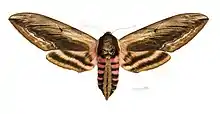| Privet hawk moth | |
|---|---|
 | |
| Scientific classification | |
| Domain: | Eukaryota |
| Kingdom: | Animalia |
| Phylum: | Arthropoda |
| Class: | Insecta |
| Order: | Lepidoptera |
| Family: | Sphingidae |
| Genus: | Sphinx |
| Species: | S. ligustri |
| Binomial name | |
| Sphinx ligustri | |
| Synonyms | |
| |
Sphinx ligustri, the privet hawk moth, is a moth found in most of the Palearctic realm. The species was first described by Carl Linnaeus in his 1758 10th edition of Systema Naturae.
Description
It has a 12 centimetres (4.7 in) wingspan (generally deflexed at rest), and is found in urban areas, forests and woodlands.
The male privet hawk moth can make a hissing sound, if disturbed, by rubbing together a set of scales and spines at the end of its abdomen.
The larvae are usually found between July and August: and bury themselves in the earth when preparing to become a pupa. They then fly in the following June.[2]
Diet
As its name describes, the caterpillars feed on privets, as well as ash trees, lilacs, jasmine, and a number of other plants.
Gallery
 Female, dorsal side
Female, dorsal side Female, ventral side
Female, ventral side Male, dorsal side
Male, dorsal side Male, ventral side
Male, ventral side
 Caterpillar
Caterpillar Pupating
Pupating Pupa
Pupa Pupa, caterpillar, and adult
Pupa, caterpillar, and adult
References
- ↑ "CATE Creating a Taxonomic eScience - Sphingidae". Cate-sphingidae.org. Archived from the original on 2012-11-26. Retrieved 2011-11-01.
- ↑ Donovan, Edward (1792). The Natural History of British Insects: Explaining Them in Their Several States, With the Periods of Their Transformations, Their Food, Economy, &c. Together With the History of Such Minute Insects As Require Investigation by the Microscope: The Whole Illustrated by Coloured Figures, Designed and Executed from Living Specimens. London. p. 79.
External links
 Media related to Sphinx ligustri at Wikimedia Commons
Media related to Sphinx ligustri at Wikimedia Commons Data related to Sphinx ligustri at Wikispecies
Data related to Sphinx ligustri at Wikispecies- "69.006 BF1976 Privet Hawk-moth Sphinx ligustri Linnaeus, 1758". UKMoths. Retrieved December 13, 2018.
- Pittaway, A. R. (2018). "Sphinx Linnaeus, 1758". Sphingidae of the Western Palaearctic. Retrieved December 13, 2018.
- "06832 Sphinx ligustri Linnaeus, 1758 - Ligusterschwärmer". Lepiforum e.V. Retrieved December 13, 2018.
This article is issued from Wikipedia. The text is licensed under Creative Commons - Attribution - Sharealike. Additional terms may apply for the media files.